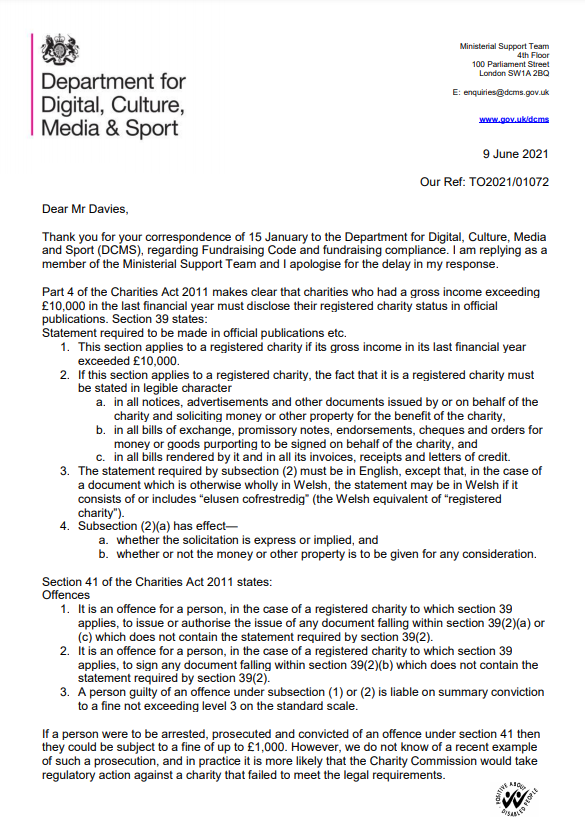
Compliance with charity laws: everything you need to know
After months of research, we have created your ultimate guide to compliance within the Charity sector.

As a charity, you should spend your time on tasks that move your mission forward. Having to delve into government documents around legislative compliance can therefore be both confusing and frustrating.
Complying with legislation means your organisation follows the government’s rules and standards. It is a vital part of running a charity without setbacks. But to get there, you must aware of the legislation and able to demonstrate that you are taking responsibility for them.
At RightMarket, our job is to make things simple and uncomplicated. So, when a client asked us how a specific set of rules affected their materials (with a letter just like the above), we took on the task of finding out.
Now, we’ve done the research. Moreover, we got advice from the experts, including the Fundraising Regulator, the Chartered Institute of Fundraising and the Department for Digital, Culture, Media & Sport.
Like us, you’re probably not a fan of legal jargon, so we have compiled our knowledge into a list of FAQs (in digestible language). You can then check it against your fundraising materials or use to explain compliance to your team.
A quick FAQ
When do these rules apply to our charity?
It applies if your charity is registered in England and Wales, and had a gross income of £10,000 in its last financial year.
What do I need to state on my materials?
You must state the fact that it is a registered charity in legible character on all materials.
What does “all materials” constitute?
All materials includes:
- Notices, advertisements and other documents issued by or on behalf of the charity soliciting for money or other property for the benefit of the charity
- Bills of exchange, promissory notes, endorsements, cheques and orders for money or goods
- Bills rendered by the charity and in all its invoices, receipts and letters of credits
Does the statement need to be in English?
The statement must be in English. However, if the document is wholly in Welsh, the statement may be in Welsh if it includes “elusen cofrestredig” (the Welsh equivalent of “registered charity”).
What happens if I don’t comply?
If you issue, sign or authorise any document that does not comply, you will be liable for a conviction fine not exceeding level 3 on the standard scale. This means a fine of up to £1,000.
Is being prosecuted for an offence common when not complying?
In practice, it is unlikely you will be prosecuted (however, not impossible). It is more likely that the Charity Commission would take regulatory action against a charity that failed to meet the legal requirements.
When does “in aid of” and “on behalf of” need to be used?
“In aid of” means supporters raise funds on their own for a charity independently of the charitable institution. Supporter fundraisers must use the expression ‘in aid of’ on fundraising material to distinguish it from fundraising carried out by the charity itself. If the ‘In Aid of’ Logo isn’t used, the Charity could be held liable for the event.
Alternatively, “on behalf of” volunteers are providing a service for the charity to raise funds on its behalf. They therefore must use the expression ‘on behalf of’ on the fundraising material they create.
As a charity, you should ensure your fundraisers understand they are responsible for any liability relating to their fundraising and its organisation.
When can I use the Fundraising Regulator badge?
The Fundraising Regulator badge can only be used on fundraising material by charities that have registered with the Fundraising Regulator. The Fundraising Regulator takes unauthorised use of the Fundraising Badge very seriously. So make sure you have permission to use it.
What happens if I use the Fundraising Regulator badge incorrectly?
If the Fundraising Regulator badge is used and the Charity isn’t a registered member, the Fundraising Regulator will seek its immediate removal and potentially take legal action. They will also report these organisations to other authorities and regulators who have a legitimate interest in ensuring best practice in fundraising.
We’re here to make it easier
As we’ve already mentioned, our job is to make your job easier and uncomplicated. Any design made in the RightMarket platform is compliant. We have collated all our knowledge around legislation and made sure that it is reflected on our platform.
That way, you won’t have to worry about anyone producing materials for your organisation that break the rules. Our platform protects and safeguards compliance for you. With our design platform, you can rest easy knowing your team is both aware of the legislation and at no risk of breaking it.
Do you want to understand more or have any other questions? Don’t hesitate to contact us, we’re here to help!
